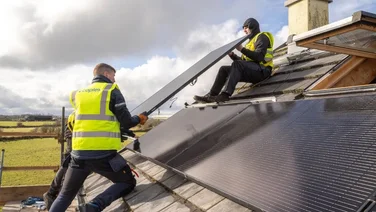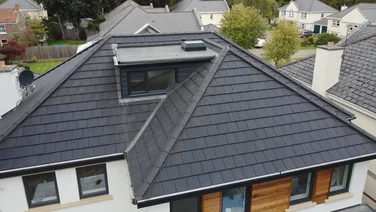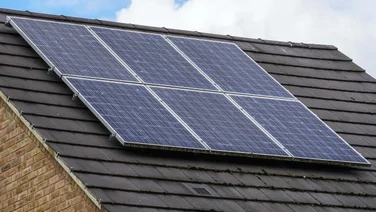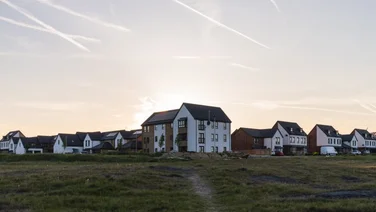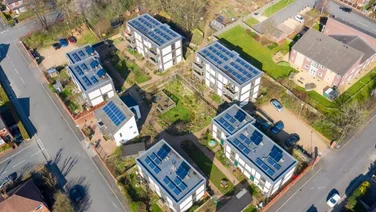- Are solar panels right for my business?
- Why should you install solar panels?
- How much do commercial solar panels cost?
- What are the requirements for installing commercial solar panels?
- What are the best ways to finance commercial solar panels?
- How popular are commercial solar panels in the UK?
- Next steps
- Summary
- Installing solar panels for your business will cut your energy costs
- Solar panels will have a positive impact on your ESG score
- The maintenance costs for commercial solar panels are very low
The UK business energy market is worth a combined £106 million for gas and electricity, as of 2024, which is a 72.3% increase from 2012, when it was just over £61 million, according to USwitch.
With energy costs so high, many businesses – both big and small – are benefitting from solar energy. While the cost of solar panels for businesses has increased in recent years, the benefits far outweigh the initial outlay.
Installing solar panels can help you reduce overheads and monthly energy bills, increase profits and improve the competitiveness of your business. It will also help reduce your business’ environmental impact.
What’s more, some consumers are actively choosing to use businesses that are trying to be as sustainable as possible, so investing in solar panels can also help drive sales.
There are also environmental, social and governance (ESG) requirements to contend with, which are laid out in the Companies Act. It includes the requirement for annual reporting, which only applies to larger companies. This is defined as those that employ more than 500 employees or exceed £500 million in annual turnover.
In this guide, we’ve covered everything you need to know about commercial solar panels and how they can help your business – however big or small.
If you are ready to get commercial solar panels for your business? Fill in our simple form with a few details, and trusted local installers will contact you with a quote.

Are solar panels right for my business?
Solar panels should be the go-to energy micro-generating solution for businesses across the UK. Not only do they help businesses save money on energy costs, but they also help promote your business as environmentally-friendly.
The majority of businesses operate in the daytime, so it makes financial sense to switch to solar energy. Even if you operate at night, combining solar panels with solar batteries means you could continue powering your business after dark.
As renewable energy becomes an ever-greater share of the UK’s energy supply, more and more businesses will make the switch. Get ahead of the curve and use solar panels to power your business.
Here are some questions you should ask yourself before investing in commercial solar panels for your business:
- Are my energy bills too high?
- Can I afford the upfront costs?
- Could I lease a solar panel system?
- Is a Power Purchasing Agreement (PPA) right for my business?
- Will going green benefit my business’ public image?
You can find out more about the cost of your energy by looking at your latest utility bill. This will give you an idea of how much energy you’re using and what you’re being charged per kilowatt (kW).
From there, research the costs of a commercial solar panel system. Each supplier will have their own pricing structure, so it’s worth reaching out to at least five different companies for a quote. Read TrustPilot customer reviews to gain a better understanding of their customer service levels, maintenance, etc. These companies will also be able to provide you with more information on leasing solar panels and whether they offer a PPA.
To determine if solar panels will improve your public image, think about your audience or customers. Are they sustainability-focused? Are they asking you about sustainable options? Talk to your audience or customers, whether in-person, email or on social media to help with this.
How many solar panels will your business need?
The average medium-sized business would need 142 solar panels to meet the typical 37,500 kWh consumed annually. This would take up 284sq metres of roof space.
For small businesses, this would mean 84 solar panels are needed, as they consume an average of 22,500 kWh each year. A system this size would use 168sq metres of roof space.
The precise scale of your commercial solar panel installation will depend on how big your business is – small and medium-sized enterprises (SMEs) won’t need as big a system as a huge office block.
It also depends on the nature of your business. A law firm won’t use as much power as an industrial facility, so even if both buildings are the same size, the amount of solar power needed will be different.
You can start roughly calculating what size solar system you might need by working out the following:
- Your electricity consumption
- The local sunlight yield (i.e. daylight hours)
- The size of your roof
Your electricity consumption can be determined through your energy supplier or on a utility bill, while you can find out your local daylight hours through the Greenwich Meantime website.

Why should you install solar panels?
Commercial solar panels are a popular choice for large-scale solar installations, such as those used to power industrial facilities. They can be installed to power both industrial processes and offices and can lead to substantial cost savings.
Commercial solar panels are typically more powerful (400W-600W) than the solar panels used for domestic purposes (250W-400W), averaging 195cm x 99cm in size, compared to 167cm x 101cm for residential panels.
Switching to solar panels will have a positive impact on reducing your business’s utility bills, cutting overhead costs and reduce your carbon footprint. And as previously stated, it will help improve your ESG score.
From an emissions perspective, the average medium-sized business will see an annual CO2 reduction of 9.9 tonnes. This reduction will become 5.8 tonnes for small businesses, and considering the 15 tonnes of CO2 typically released by SMEs each year, it’s clear that getting solar panels can be a hugely effective step in reducing your business’ carbon emissions.
Your carbon footprint is a calculation of the amount of greenhouse gases your business puts into the atmosphere. Reducing it is a great way to signal to customers that you care about the environment.
What’s more, solar panels will improve your ESG score, which can be a great signifier to both customers and future employees that your business is one that cares about the environment.
On average, a medium-sized commercial solar panel array of 30 kilowatt peak (kWp) will cut your electricity bills by £5,000 per year. Kilowatt peak is the peak potential kilowatt output of a solar panel under perfect conditions.
The maintenance costs for commercial solar panels is low, too. Keep the panels clear and free of debris and they’ll continue to generate clean and cheaper power for 25-30 years.
Smart Export Guarantee
Another great reason to install solar panels for your business is the Smart Export Guarantee (SEG).
Businesses with solar panel systems that have a capacity of 5 megawatts (MW) or less are allowed to sell energy back to the UK’s National Grid.
Most SEG tariffs pay between 3.5 and 15p per kilowatt hour (kWh), so you’re looking at hundreds rather than thousands of pounds – but it’s free money, and who’s going to say no to that?
- Lower energy bills
- Reduced carbon emissions
- Increased ESG score
- Greater energy independence
- Opportunity to profit via the SEG
- Potentially boosts the value of commercial property
- Can take years to recoup costs
- Takes a lot of roof space, so not viable for every business
- A smart meter is necessary to profit from exported electricity
How much do commercial solar panels cost?
According to the MCS, the average cost of a commercial solar panel installation so far in 2024 was £9790, or £1278 per kW. Obviously this covers a variety of installations so is only a rough guide.
Small to medium-sized businesses can expect to spend between £16,000 and £70,000 for commercial panels.
This figure will fluctuate, however, as commercial solar panel systems get larger, they become more complex and expensive to install.
That said, the more power you are able to generate through your solar panel system, the quicker you will see the benefits and break even on your investment.
The price you’ll spend will also depend on a variety of factors. The size of your roof space, your business needs, as well as the amount of energy you consume throughout the year will be taken into account. For example, if your business is operational 24 hours a day, seven days a week, solar panels will likely be more expensive compared to a business that only operates 10-12 hours a day.
Below is a table showing different sizes for commercial solar panel systems, with typical costs included as well.
System size in kilowatt peak | Average cost (including VAT) | Average number of panels |
|---|---|---|
10 kWp | £12,780 | 30 |
25 kWp | £31,950 | 75 |
50 kWp | £63,900 | 150 |
100 kWp | £127,800 | 300 |
The average medium-sized business in the UK uses around 25,000 to 55,000 kWh of electricity per year at a unit price per kWh of 26p.
For small businesses, it’s 15,000 to 25,000 kWh and 24.9p per kWh, while large businesses will use more than 55,000 kWh on average, and pay 27.8p per kWh.
Where do you want to install solar panels?
Get startedWhat maintenance costs can you expect?
The maintenance costs for commercial solar panels are usually very low. Once installed, they will need to be examined by a professional every four-to-six years.
Aside from this, your solar panel system will only require regular light cleaning to remove dust and debris and ensure maximum efficiency. Depending on where they are located, this may require a professional cleaner.
Fortunately, commercial solar panels require little maintenance in the winter, as the typically bad weather means the panels often clean themselve. In the summer, however, more work is required.
Some companies, like Empower Energy, offer maintenance packages where you can pay a fixed rate that will be tailored to the size of your system and individual needs. Its maintenance package includes an annual solar panel clean and inspection.
When it comes to getting a quote for solar panels, it’s worth asking any potential installers about any warranties, service and maintenance that is included.
What are the requirements for installing commercial solar panels?
As long as you have enough roof space, you’ll be allowed to install solar panels on your business’ building/s with little issue.
Another option is to install a solar farm, which will need local council approval.
Whether you can get approval for a large-scale commercial solar system depends on factors including:
- The visual impact of the solar system
- The extent to which it will benefit the local community
- The impact the solar system will have on the surrounding ecosystem
- Local electricity grid connectivity (can the grid accommodate a large-scale solar system?)
Will I need planning permission for commercial solar panels?
Most businesses can benefit from Permitted Development Rights, which means they’ll have no issue installing roof-mounted solar panel systems, regardless of size.
It’s more challenging if a business wants to install a ground-mounted solar panel system however, as any system larger than 9m2 will require planning permission.
If a ground-based installation is smaller than 9m2, it must meet the following conditions to avoid needing planning permission:
- The solar array must be no more than four metres high
- The solar array must be installed more than five metres away from the property boundary
- If located within a conservation area or a world heritage site, the solar array can’t face a motorway or be visible from a motorway
You will also need planning permission where your building or property is designated as a historic site or is in a conservation area.
You should always check for additional planning permission you’ll need before agreeing to get anything done.
For more information on the legal details, the UK government’s Town and Country Planning Order has everything your business needs to know.

What are the best ways to finance commercial solar panels?
While commercial solar panels can be expensive, there are several ways to mitigate the costs.
Firstly, there’s a Power Purchase Agreement (PPA), which is financing arrangement that lets businesses purchase solar power without the upfront costs.
Through a PPA, a business can rent its roof and purchase discount solar electricity, instead of investing in a solar system to call its own.
This way, businesses can get all of the advantages of solar panels, including the cost savings, without having to actually buy a solar system outright.
Furthermore, when they are ready to buy their solar system, the PPA allows for this.
Many PPAs give businesses the solar system at the end of a 25-year period, at no extra cost – which is great. Older generations of solar panels have a lifespan of 25-30 years, but new models can keep going for 40-50 years.
The government also offers region-specific grants to businesses.
Tees Valley
A Net Zero scheme is available to businesses in Tees Valley, which covers five council areas: Darlington, Hartlepool, Middlesbrough, Redcar and Cleveland and Stockton-on-Tees.
Businesses in Tees Valley can benefit from fully-funded consultancy support and up to £2,000 grant funding, alongside easy access to online tools and regular webinars and workshops.
The online tools can be accessed via the Tees Valley website, but it requires business owners to calculate and report carbon emissions, in turn, giving you insight and knowledge to set reduction targets for your business.
To receive the £2,000 grant towards implementing this carbon-saving activity, business owners will need to sign up, which is due to close 31 March 2025.
Low Carbon Workspace
Low Carbon Workspaces grant that provides support for businesses in Buckinghamshire, Berkshire, Hertfordshire, Northamptonshire, Bedfordshire, Luton and Milton Keynes.
By switching to energy-efficient measures, including solar panels, businesses in these areas can get a grant of £5,000.
Low Carbon Dorset
Businesses looking for solar panels in Dorset get an even better deal. With the Low Carbon Dorset scheme, you can get grants for up to 50% of your low carbon project costs, between £1,000 and £75,000.
These grants can be used towards costs relating to the installation of energy efficiency and/or renewable energy measure, this includes:
- Contractors and consultants
- Equipment and machinery
- Installation, commissioning and associated works
There are also additional tax benefits for companies that install commercial solar panels, in the form of capital allowances.
When will your business break even on solar panels?
The average time to break even on solar panels is 14.55 years, regardless of the system’s size. It will almost certainly be quicker for businesses however, because most businesses operate during the day, which means they can take better advantage of the free electricity.
Homes with solar panels typically won’t be using the free electricity generated during the sun’s peak intensity, which makes the break-even point longer than it would for businesses.
As mentioned, selling excess electricity back to the grid via the SEG will mean that you are able to break even faster.
How popular are commercial solar panels in the UK?
More and more businesses across the UK are adopting commercial solar panels, with big names such as Tesco making the switch to clean, solar electricity.
The supermarket recently unveiled new plans to install solar panels across 100 stores over the next three years.
The initiative could generate around 20 gWh of electricity, which is enough to charge the equivalent of 300,000 Tesco electric home delivery vans.
This announcement will build on the 40 Tesco stores that already have solar panels fitted, generating more than 10.5 gWh of green electricity in the past year, which is equivalent to 3,800 homes.
Another example is Novatech, one of the UK’s largest retailers of computer products.
The company worked with Infinity Energy to carry out a site visit and survey, and installed a 403.2 kWp system with 825 x 490W monocrystalline solar panels and three 110kW inverters.
The payback period was just four years and enabled the company to save £52,297 per annum. Over 20 years, the installation will make a profit of £1,101,356.
Next steps
Commercial solar panels are already powering businesses across the UK, with all the benefits that solar energy brings.
Lower energy bills, reduced carbon emissions, and the positive public image that comes with green credentials make commercial solar panels well worth the investment.
If you’re ready to find solar panels for your business, we can help. Just fill in this simple form and our trusted suppliers will get in touch with bespoke quotes.
Summary
- Installing solar panels on your business’ building(s) can help cut energy costs and also boost your ESG score, if you have one
- The price of commercial solar panels depends on a number of factors, but a small-to-medium sized business can expect to pay between £16,000 and £70,000
- Solar panels on commercial buildings come under Permitted Development Rights, meaning it’s usually fine to install them without needing planning permission.
- If you have a ground-mounted solar panel system on the other hand, you’ll typically need planning permission if it exceeds nine square meters.


